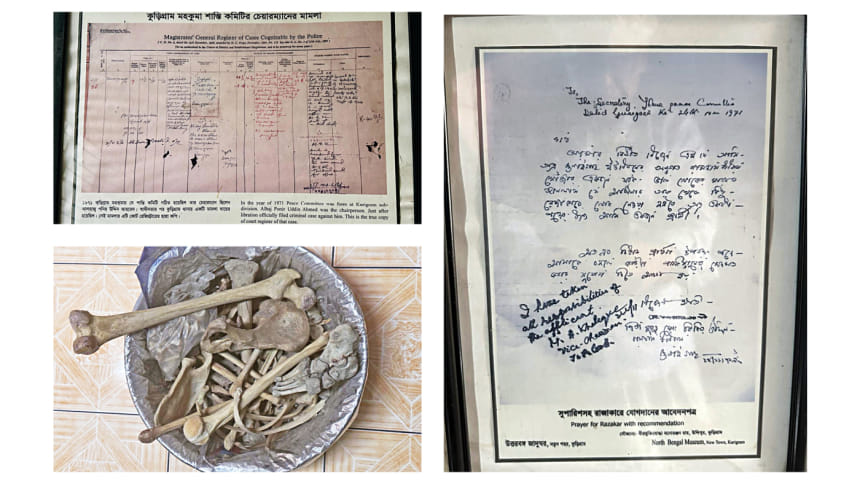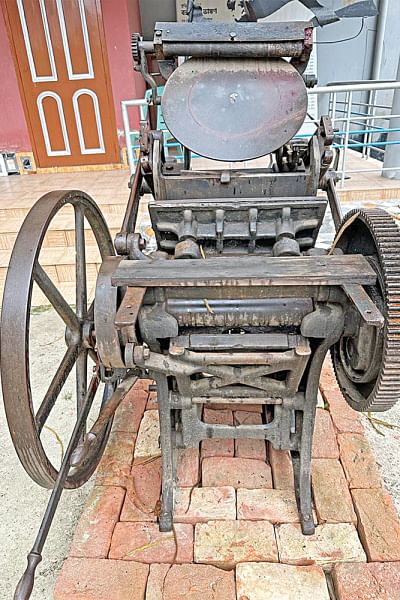The north remembers

In Kurigram, a district in northern Bangladesh, there's a house with a collection of over 5,000 war artifacts.
'Lincoln's Inn', a duplex residence that was named after house owner SM Abraham Lincoln, has been rebranded as North Bengal Museum.
And rightfully so. The unique thing about this museum is it holds hundreds of rare applications from those who volunteered to become Razakars (local collaborators of the then Pakistani occupation army), and evidence of organised crimes committed against Hindus in 1971.
There are documentation of how Razakaas had applied to Pakistani forces to occupy a house of one Dhiresh Bagchi, and take over a shop of Kaushal Paul or fell a tree of a Shyamacharan Barman.
The museum exhibits the original leaflet dropped from the air by the combined forces under Field Marshal Sam Manekshaw's command, urging the Pakistani occupation forces to surrender ("Hatiar Daldo"). Additionally, it showcases all 20 copies of Ogrodut, a cyclostyled newspaper published from the war zone.

The museum displays photographs depicting the Kodalkati war, featuring Taramon Bibi Birprotik and Subedar Major Altaf Hossain's involvement. It exhibits soil from various mass graves nationwide, along with documents from civil administration and the initial judiciary proceedings of the Mujibnagar government. Additionally, the museum showcases artifacts used by around 3,000 freedom fighters, alongside information including fingerprints, documents of surrenders, cases against collaborators, and memorials of national heroes like Bangabandhu and martyred intellectuals.
Lincoln himself collected this evidence of war over the years.
"What I've done is simply collecting stories. If these stories reveal a freedom fighter, then the credit belongs to them. But if it exposes a Razakar, remember, they weren't outsiders, but our own people. Facing this truth is crucial," said Lincoln.
Lincoln, assisted by his wife Prof Nazmun Nahar, started the museum in 2012.
"We started displaying our collected evidence of the war in the living room; then those gradually spilled to the balcony. When the balcony could no longer hold, even our bedrooms were not spared. During the day, visitors explore our house. At night, it becomes our family space again," Lincoln said.
The Ministry of Liberation War Affairs is constructing a multi-storied building beside Lincoln's residence. Once completed, the museum will be shifted there.
"I felt that the memory of the Liberation War was fading among several generations during the two-decade-long rule by anti-liberation forces since the assassination of Bangabandhu. I decided to do something to preserve the war's history," Lincon said.
Lincoln received Ekushey Padak two years ago for his contributions to social service. This year, he has been nominated for Swadhinata Padak, the country's highest civilian honour.
Lincoln informed he had donated his Ekushey Padak money to a trust formed for running the museum. He plans to donate his Swadhinata Padak money too.
"The museum is my child. It will inherit half of my properties, while my son will get the other half," he added.
Senior journalist Ahmed Shafi Uddin said, "Awarding Lincoln with the Swadhinata Padak was fitting because he devoted his entire life to serving the masses. Lincoln was unmatched in his proactive approach to taking necessary steps for the people and the country, without waiting for assistance or support."

 For all latest news, follow The Daily Star's Google News channel.
For all latest news, follow The Daily Star's Google News channel. 



Comments